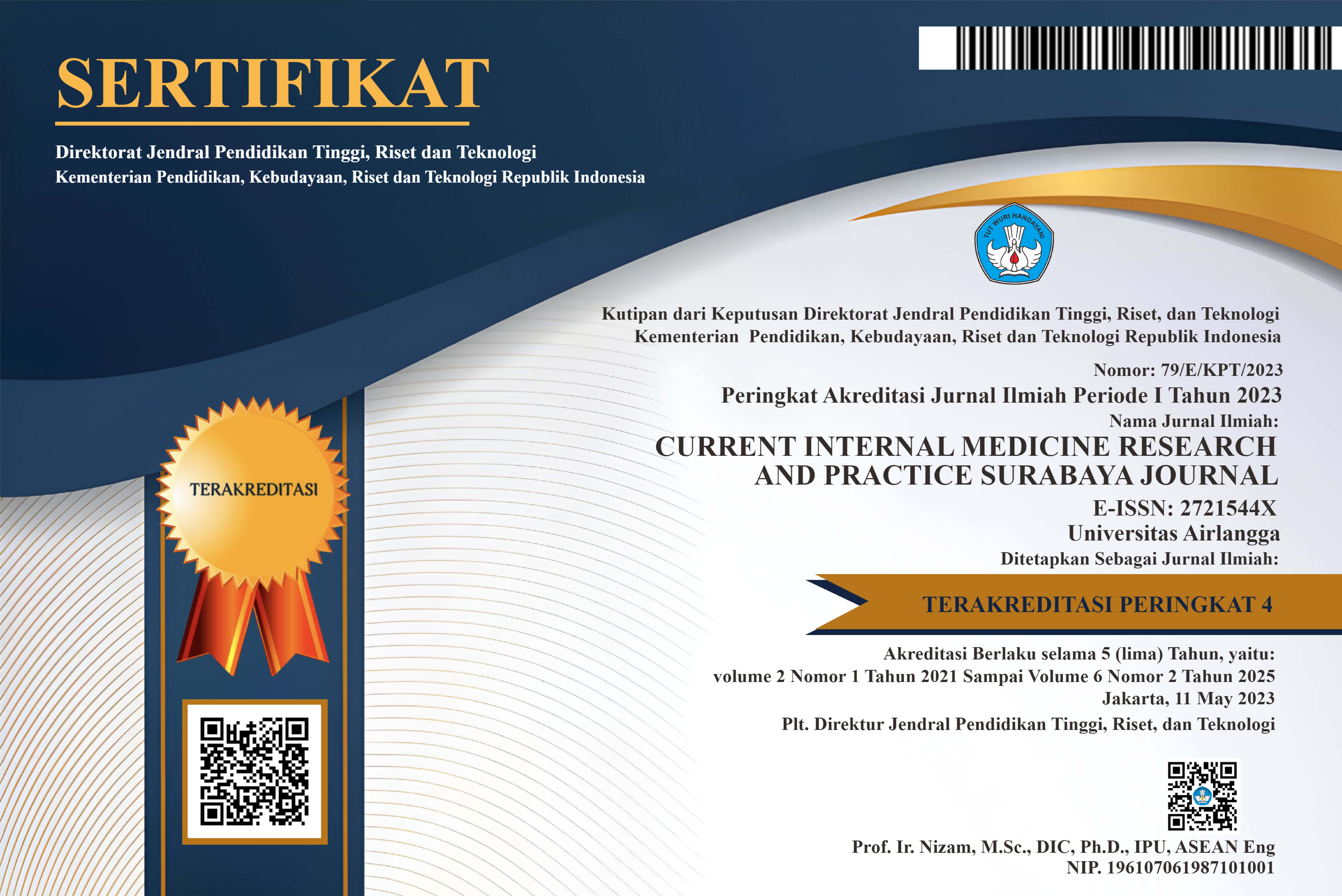Several Factors Associated With Nitrogen Balance In Elderly Patients
Downloads
Background
Nitrogen balance is the method used to assess the protein adequacy. A negative nitrogen balance means that the body suffers from protein energy malnutrition.
Objective
To determine the risk factors that associated with nitrogen balance in the elderly patients who were inpatient in IRNA Internal Medicine Dr.Soetomo Hospital.
Methods
The experimental design of the research used was analytic observational with the cross-sectional design. The study was conducted of 50 elderly patients. Risk factors measured were protein intake using food recall and nitrogen excretion that expressed in Urea Nitrogen Urine (gr / 24 h). The nitrogen balance was derived from the difference between nitrogen intake and nitrogen excretion in 24 hours. Bivariate data analysis using Chi square or exact fisher test, while multivariate data analysis using logistic regression test.
Results
In bivariate analysis, risk factors significantly associated with negative nitrogen balance were decreased renal function (LFG <90 ml / min / 1.73 m2), prolonged bed rest> 7 days and malnutrition. Other risk factors not significantly associated with negative nitrogen balance were diabetes mellitus, random blood sugar> 180 mg / dl, hypoalbumin and CRP> 6 mg / dl. In multivariate analysis showed the decrease of renal function and duration of bed rest > 7 days was significant.
Conclusion
The decreased renal function and bed rest for more than 7 days was a risk factor for protein malnutrition in elderly patients.
Lieberman M, Marks AD, Smith CM, Marks DB. Biokimia Kedokteran Dasar. Suryono, editor. Jakarta: Penerbit Buku Kedokteran EGC; 2007. 12 - 4 p.
Smil V. Nitrogen and food production: proteins for human diets. AMBIO: A Journal of the Human Environment. 2002;31(2):126-31.
Musso CG, Núñez JFM. Feed-back between geriatric syndromes: general system theory in geriatrics. Springer; 2006.
Brownie S. Why are elderly individuals at risk of nutritional deficiency? International journal of nursing practice. 2006;12(2):110-8.
Rubenstein LZ, Harker JO, Salví A, Guigoz Y, Vellas B. Screening for undernutrition in geriatric practice: developing the short-form mini-nutritional assessment (MNA-SF). The Journals of Gerontology Series A: Biological Sciences and Medical Sciences. 2001;56(6):M366-M72.
Morais J, Chevalier S, Gougeon R. Protein turnover and requirements in the healthy and frail elderly. The journal of nutrition, health & aging. 2006;10(4):272.
Ahmed T, Haboubi N. Assessment and management of nutrition in older people and its importance to health. Clinical interventions in aging. 2010;5:207.
Carrero JJ, Stenvinkel P, Cuppari L, Ikizler TA, Kalantar-Zadeh K, Kaysen G, et al. Etiology of the protein-energy wasting syndrome in chronic kidney disease: a consensus statement from the International Society of Renal Nutrition and Metabolism (ISRNM). Journal of Renal Nutrition. 2013;23(2):77-90.
Epel ES. Psychological and metabolic stress: a recipe for accelerated cellular aging. Hormones (Athens). 2009;8(1):7-22.
Kurpad A, Vaz M. Protein and amino acid requirements in the elderly. European Journal of Clinical Nutrition. 2000;54(S3):S131.
Kagansky N, Berner Y, Koren-Morag N, Perelman L, Knobler H, Levy S. Poor nutritional habits are predictors of poor outcome in very old hospitalized patients. The American journal of clinical nutrition. 2005;82(4):784-91.
Smoliner C, Norman K, Scheufele R, Hartig W, Pirlich M, Lochs H. Effects of food fortification on nutritional and functional status in frail elderly nursing home residents at risk of malnutrition. Nutrition. 2008;24(11):1139-44.
Pannemans DL, Wagenmakers AJ, Westerterp KR, Schaafsma G, Halliday D. The effect of an increase of protein intake on whole-body protein turnover in elderly women is tracer dependent. The Journal of nutrition. 1997;127(9):1788-94.
Saka B, Kaya O, Ozturk GB, Erten N, Karan MA. Malnutrition in the elderly and its relationship with other geriatric syndromes. Clinical nutrition. 2010;29(6):745-8.
Babineau J, Villalon L, Laporte M, Payette H. Outcomes of screening and nutritional intervention among older adults in healthcare facilities. Canadian Journal of Dietetic Practice and Research. 2008;69(2):91-6.
Cano N, Fiaccadori E, Tesinsky P, Toigo G, Druml W, Kuhlmann M, et al. ESPEN guidelines on enteral nutrition: adult renal failure. Clinical Nutrition. 2006;25(2):295-310.
Ganesan MV, Annigeri RA, Shankar B, Rao BS, Prakash KC, Seshadri R, et al. The protein equivalent of nitrogen appearance in critically ill acute renal failure patients undergoing continuous renal replacement therapy. Journal of Renal Nutrition. 2009;19(2):161-6.
Sawe N, As'ad S, Satriono R. Korelasi Diet Rendah Protein terhadap Keseimbangan Nitrogen pada Pasien Penyakit Ginjal Kronik. Universitas Hasanuddin Makasar. 2012:1 - 12.
Ferrando AA, Lane HW, Stuart CA, Davis-Street J, Wolfe RR. Prolonged bed rest decreases skeletal muscle and whole body protein synthesis. American Journal of Physiology-Endocrinology And Metabolism. 1996;270(4):E627-E33.
Teasell R, Dittmer D. Complications of immobilization and bed rest. Part 2: Other complications. Canadian Family Physician. 1993;39:1440.
Rousseau P. Immobility in the aged. Archives of family medicine. 1993;2(2):169.
Copyright (c) Author
1. The journal allows the author to hold the copyright of the article without restrictions.
2. The journal allows the author(s) to retain publishing rights without restrictions.
3. The formal legal aspect of journal publication accessibility refers to Creative Commons Atribution-Share Alike 4.0 (CC BY-SA).






















